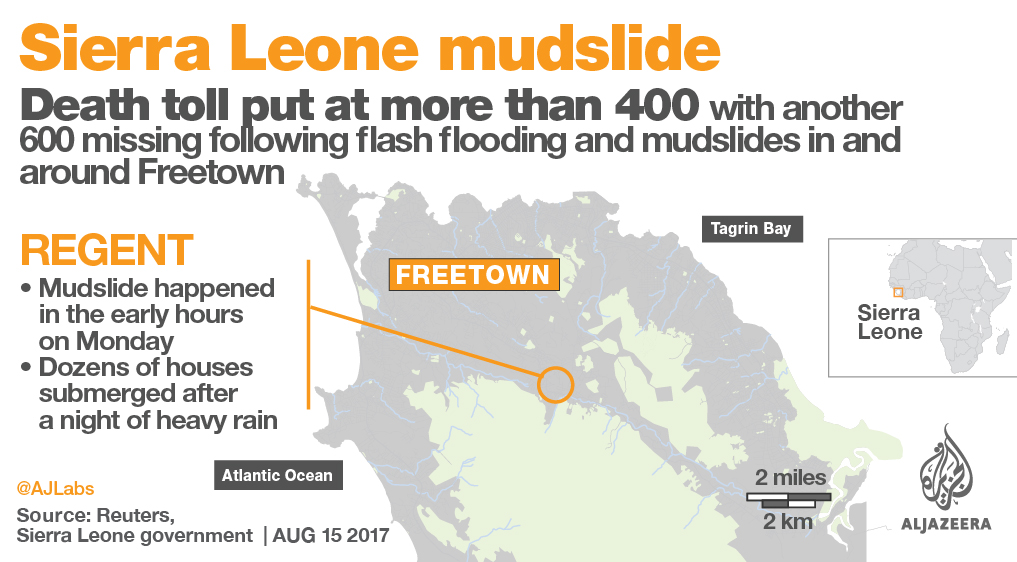People rush to bury their dead amid fears of disease outbreak after a flood disaster that has killed over 400 people.
![Mass burials after devastating Sierra Leone mudslide At least 600 people are still missing in the capital Freetown [Saidu Bah/AFP]](https://www.aljazeera.com/mritems/imagecache/mbdxxlarge/mritems/Images/2017/8/17/c54af2d683d84c138fd852db9a104d09_18.jpg)
Facing the threat of disease, people in Sierra Leone began burying hundreds of victims of a mudslide that swept away homes on the edge of the capital, Freetown, in one of Africa’s worst flood disasters in living memory.
More than 400 people have been confirmed dead – at least a quarter of them children – from the devastating mudslides that hit before dawn on Monday, triggered by days of heavy rain.
Hundreds of Freetown residents queued on Wednesday to identify relatives crushed by mud on Monday in a valley on the outskirts of Freetown.
Aid workers said there was a high risk of disease outbreaks such as cholera, as corpses are lying out in the open in the heat.
The government summoned families to the morgue and said all unidentified corpses would be buried on Thursday and Friday.
In a statement on Wednesday, President Ernest Bai Koroma’s office asked relatives to come to the city’s overwhelmed mortuary. All unidentified corpses will be given a “dignified burial” in the coming days, it said.
 |
Authorities have requested airconditioning units to keep the bodies cool and are in need of more protective gear such as masks, aprons and glove disposal stations, said Idalia Amaya, an emergency relief coordinator for Catholic Relief Services (CRS).
“The morgues are just overflowing with corpses and it is becoming a public health emergency,” Amaya said. “They need to get the bodies out.”
Plea for international help
Red Cross officials estimated some 600 people remained missing more than 48 hours after the storm hit while most of the victims slept. Thousands of people lost their homes.
Sierra Leone’s government has pleaded for international assistance as it reels from yet another disaster just a couple of years after the Ebola outbreak that left thousands in the region dead. With rain forecast for at least the coming week, the threat of further mudslides around Freetown remained.
READ MORE: Sierra Leone mudslide: What, where and why?
Freetown chief coroner Seneh Dumbuya told Reuters that the burial of 297 of the bodies was under way. They were being transported to the Ebola cemetery at Waterloo, about 30km outside of Freetown, Dumbuya said.
“We cannot wait for tomorrow for the burial, as was suggested by government, because most of the bodies are decomposing,” he said. “The burial will continue up till night.”
Dumbuya anticipated that the death toll would rise as the search continued for more than 600 still missing.
Rescue work under way
Rescue teams have continued the work of extracting bodies from tonnes of debris, with volunteers digging with pickaxes and, at times, only their hands.
Amaya from CRS’s said: “People are getting text messages from their loved ones saying they’re trapped inside buildings and for someone to come rescue them.”
Sobbing and covering their noses from the stench, relatives stepped around corpses lying on the ground outside the morgue, which was overwhelmed, as the sheets covering them were lifted.
“I came to identify my uncle in particular, but I couldn’t find him,” said 30-year-old Hawanatu Sesay, after her turn came to look through the morgue.
“Let his soul rest in peace,” she said through tears.
‘Strength and resilience’
Another man said he had identified his wife’s body but had no news of his two young daughters. All had been buried when their house was engulfed in mud, he said.
President Koroma visited Lumley in the capital Freetown, one of the worst affected areas.
Satellite images released showed the extensive damage caused by deadly mudslides and floods.
Musa Kallon, a trauma support expert working with the CRS, shared the stories of devastation with Al Jazeera after he visited Kamayama community on the outskirts of Freetown.
“Most of the people I spoke with today are the sole surviving members of their family,” Kallon said. “People are really traumatised. I spoke to one lady who lost almost her entire family during the ebola crisis. Her only surviving daughter passed away in these floods.”
Kallon and Amaya both stressed that despite the poverty and waves of trauma that have afflicted Sierra Leoneons, from the 1991-2001 civil war to the 2014 outbreak of ebola, and now to this flood disaster, the “strength and resilience” of the people has been a small light in this tragedy.
“Christians and Muslims regardless of what faith they are, they have come together to help dig out people from the mud, provide clothes and shelter to those who are most affected, particularly women and children,” Amaya said. “They are strong and banding together.”
Source: Al Jazeera and news agencies





